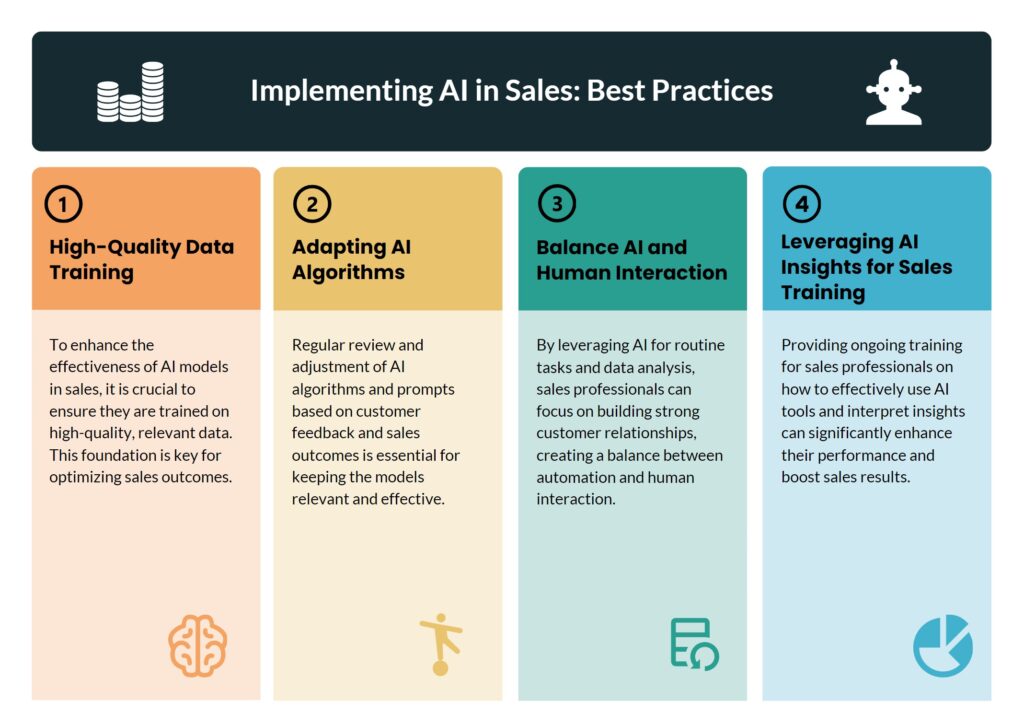The traditional role of sales professionals is being redefined as AI technologies become more sophisticated, capable of automating complex tasks, and offering personalized customer experiences.
This evolution presents an opportunity for sales teams to leverage AI not as a replacement but as a powerful tool to enhance sales strategies, improve efficiency, and drive business growth.
The AI-Enhanced Sales Process
AI’s ability to process and analyze vast amounts of data at unprecedented speeds allows for the identification of patterns, preferences, and potential leads that might go unnoticed by human analysts.
By integrating AI into the sales process, businesses can refine their sales pitches, tailor their offerings to individual customer needs, and optimize their sales cycles. This doesn’t diminish the importance of human sales professionals; rather, it shifts their role towards more strategic tasks.
Training AI for Enhanced Performance
The process of training AI for sales excellence involves continuously feeding it with real-world sales data and outcomes. This iterative process allows the AI to learn from successes and failures, fine-tuning its approach to sales interactions.
Sales professionals play a crucial role in this training process, using their expertise to adjust AI algorithms, scripts, and response strategies based on customer feedback and sales results.
For instance, if an AI-driven sales script generates a positive response in 80% of interactions but falls short in 20%, sales professionals can analyze the feedback from these unsuccessful interactions to identify patterns or shortcomings in the script.
By making targeted adjustments to the AI’s approach based on this analysis, sales teams can strive to enhance the script’s effectiveness, aiming to increase the success rate in future interactions.
Understanding Customer Interactions
Every manual intervention—be it an email that bypasses automation or a customer phone call—signals a potential flaw in the automated system. These anomalies are not merely inconveniences but opportunities for introspection and improvement.
They prompt a crucial question: “What went wrong?” This mindset encourages a proactive approach to refining AI systems, ensuring they meet customer needs effectively and efficiently.
The Art and Science of Sales Orchestration
Continuous Optimization
Sales AI is not a “set and forget” system but a dynamic entity that requires ongoing adjustment and fine-tuning. Changes in market conditions, customer preferences, and product offerings necessitate regular updates to sales scripts, pitches, and processes. This continuous optimization process is both an art and a science, relying on creativity, analysis, and strategic thinking.
Quantifying Contribution
The adoption of AI in sales allows for the quantification of one’s contribution to the company. With measurable metrics, such as the accuracy of sales scripts over time, sales orchestrators can identify trends, pinpoint areas for improvement, and adapt strategies to enhance performance. This data-driven approach facilitates a deeper understanding of the sales process and its impact on the business.
The Role of Sales Orchestration
Sales orchestrators play a pivotal role in designing, implementing, and refining AI-driven sales processes. Their expertise is not in executing sales directly but in crafting strategies that leverage AI to achieve superior results. This involves not only the initial setup but also the ongoing management and optimization of the sales process.
The Future Role of Sales Professionals
The advent of AI in sales doesn’t signal the redundancy of human sales roles but rather indicates a shift towards more analytical and strategic functions. Sales professionals are transitioning from being the primary point of contact for customers to becoming the architects of AI-driven sales strategies. Their expertise is essential in:
- Training and fine-tuning AI models: Using real-world sales data to improve AI accuracy and effectiveness.
- Interpreting AI-generated insights: Leveraging AI’s data analysis capabilities to inform strategic decisions.
- Maintaining human touch: Ensuring that AI-driven processes retain a personal element, critical for building customer relationships.
Implementing AI in Sales: Best Practices

- Start with a solid data foundation: Ensure that your AI models are trained on high-quality, relevant data to increase their effectiveness.
- Focus on continuous improvement: Regularly review and adjust AI algorithms and scripts based on customer feedback and sales outcomes.
- Balance AI and human interaction: Use AI to handle routine tasks and data analysis, allowing sales professionals to focus on building deeper customer relationships.
- Educate your team: Provide ongoing training for sales professionals on how to best leverage AI tools and interpret their insights.
The Broader Impact on Business Processes
Beyond Sales: A Holistic Approach
The implications of AI integration extend beyond the sales department, affecting various aspects of business operations. From customer service to marketing, AI offers opportunities to streamline processes, enhance decision-making, and improve customer experiences. Businesses that embrace AI at the core of their strategy can achieve a competitive edge, driving innovation and growth.
Preparing for the Future
The transition to Sales 2.0 requires a mindset shift among sales professionals. The future belongs to those who can adapt to and embrace the changes brought about by AI.
By focusing on the orchestration of sales processes, leveraging data for continuous improvement, and staying ahead of technological advancements, sales professionals can secure their place in the evolving business landscape.
The integration of AI into the sales process offers a compelling opportunity to enhance efficiency, personalize customer interactions, and drive sales growth. As AI takes on more routine tasks, the role of sales professionals is elevated to that of strategic advisors and AI trainers.
By embracing this shift, businesses can harness the full potential of AI to redefine the sales landscape, making it more dynamic, efficient, and responsive to customer needs. The future of sales lies in the harmonious collaboration between AI and human intelligence, each amplifying the strengths of the other.
Related: The End of Traditional Sales | AI’s Disruptive Takeover

